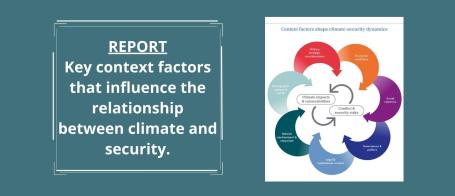Context matters: A review of the evidence of how social, economic, and other variables influence the relationship between climate and security
Download the full report here.
The links between climate and security are usually indirect and involve different pathways. Among others, these pathways may include the degradation of climate-sensitive natural resources and the loss of livelihoods that depend on these resources; disputes over access to these resources; displacement of people and animosity towards migrants; food insecurity and food price hikes that lead to political tensions; grievances related to poor disaster response and management by responsible agencies and organisations; or unintended consequences of climate and environmental policies.
Specific conditions or moderating factors influence how these pathways will manifest. Depending on these conditions, people will be more or less vulnerable to the impacts of climate change and to their possible knock-on effects on livelihoods, conflict, and displacement.
Based on our review of more than 150 studies, and considering these different context factors, we identify key recommendations that shape climate-security dynamics across the globe:
- Pull levers in different sectors
Climate change-induced security risks are more than just climate change mitigation. There are many entry points in different sectors that can also minimise the security risks that climate change entails.
- Invest in the agency, capacity, and safety of vulnerable and marginalised communities
As the most vulnerable societies bear the brunt of the security risks stemming from climate change, the prevention of climate-security risks must emphasise the most vulnerable and marginalised communities in terms of economic opportunities, social status, access to services, and influence on political processes.
- Put in place effective, inclusive, and coherent institutional mechanisms
Investments in institutional mechanisms are crucial as climatic conditions are deteriorating in many places – and will continue to do so for a considerable time, even if climate mitigation efforts become much more ambitious.
- Place climate change adaptation at the centre of risk reduction strategies.
Climate change adaptation has an important role to play in the prevention of climate-related security risks and in achieving peace and security in fragile countries.
- Make climate policy peace-positive
The social impact of climate finance is often overlooked. However, context- and conflict-sensitive approaches to avoid backdraft are very much needed in situations where risk reduction measures inadvertently aggravate social and environmental vulnerabilities.
- Climate and security: a matter of “where” and “under what conditions” instead of “whether”
Reality is far more complex than “Does climate change lead to more conflict or not?” Discussions need to put emphasis on the interaction of social and environmental drivers behind climate fragility and pay more attention to locally led research and expertise from around the world.
This paper builds on insights from the ‘CASCADES’ project under the European Union’s Horizon 2020 research and innovation programme, as well as of the German Federal Foreign Office-funded project ‘Climate, Peace and Security’.
Share on


